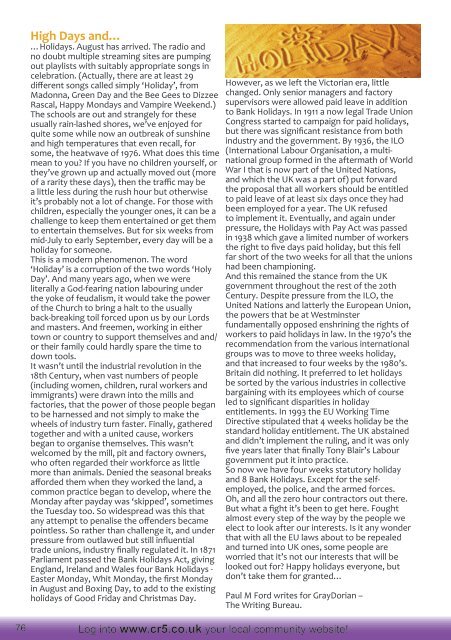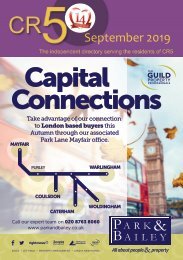CR5 Issue 147 August 2017
A free community magazine for the CR5 Postcode containing local business advertising, interesting reads, What's On in the area and puzzles
A free community magazine for the CR5 Postcode containing local business advertising, interesting reads, What's On in the area and puzzles
Create successful ePaper yourself
Turn your PDF publications into a flip-book with our unique Google optimized e-Paper software.
High Days and…<br />
…Holidays. <strong>August</strong> has arrived. The radio and<br />
no doubt multiple streaming sites are pumping<br />
out playlists with suitably appropriate songs in<br />
celebration. (Actually, there are at least 29<br />
different songs called simply ‘Holiday’, from<br />
Madonna, Green Day and the Bee Gees to Dizzee<br />
Rascal, Happy Mondays and Vampire Weekend.)<br />
The schools are out and strangely for these<br />
usually rain-lashed shores, we’ve enjoyed for<br />
quite some while now an outbreak of sunshine<br />
and high temperatures that even recall, for<br />
some, the heatwave of 1976. What does this time<br />
mean to you? If you have no children yourself, or<br />
they’ve grown up and actually moved out (more<br />
of a rarity these days), then the traffic may be<br />
a little less during the rush hour but otherwise<br />
it’s probably not a lot of change. For those with<br />
children, especially the younger ones, it can be a<br />
challenge to keep them entertained or get them<br />
to entertain themselves. But for six weeks from<br />
mid-July to early September, every day will be a<br />
holiday for someone.<br />
This is a modern phenomenon. The word<br />
‘Holiday’ is a corruption of the two words ‘Holy<br />
Day’. And many years ago, when we were<br />
literally a God-fearing nation labouring under<br />
the yoke of feudalism, it would take the power<br />
of the Church to bring a halt to the usually<br />
back-breaking toil forced upon us by our Lords<br />
and masters. And freemen, working in either<br />
town or country to support themselves and and/<br />
or their family could hardly spare the time to<br />
down tools.<br />
It wasn’t until the industrial revolution in the<br />
18th Century, when vast numbers of people<br />
(including women, children, rural workers and<br />
immigrants) were drawn into the mills and<br />
factories, that the power of those people began<br />
to be harnessed and not simply to make the<br />
wheels of industry turn faster. Finally, gathered<br />
together and with a united cause, workers<br />
began to organise themselves. This wasn’t<br />
welcomed by the mill, pit and factory owners,<br />
who often regarded their workforce as little<br />
more than animals. Denied the seasonal breaks<br />
afforded them when they worked the land, a<br />
common practice began to develop, where the<br />
Monday after payday was ‘skipped’, sometimes<br />
the Tuesday too. So widespread was this that<br />
any attempt to penalise the offenders became<br />
pointless. So rather than challenge it, and under<br />
pressure from outlawed but still influential<br />
trade unions, industry finally regulated it. In 1871<br />
Parliament passed the Bank Holidays Act, giving<br />
England, Ireland and Wales four Bank Holidays -<br />
Easter Monday, Whit Monday, the first Monday<br />
in <strong>August</strong> and Boxing Day, to add to the existing<br />
holidays of Good Friday and Christmas Day.<br />
However, as we left the Victorian era, little<br />
changed. Only senior managers and factory<br />
supervisors were allowed paid leave in addition<br />
to Bank Holidays. In 1911 a now legal Trade Union<br />
Congress started to campaign for paid holidays,<br />
but there was significant resistance from both<br />
industry and the government. By 1936, the ILO<br />
(International Labour Organisation, a multinational<br />
group formed in the aftermath of World<br />
War I that is now part of the United Nations,<br />
and which the UK was a part of) put forward<br />
the proposal that all workers should be entitled<br />
to paid leave of at least six days once they had<br />
been employed for a year. The UK refused<br />
to implement it. Eventually, and again under<br />
pressure, the Holidays with Pay Act was passed<br />
in 1938 which gave a limited number of workers<br />
the right to five days paid holiday, but this fell<br />
far short of the two weeks for all that the unions<br />
had been championing.<br />
And this remained the stance from the UK<br />
government throughout the rest of the 20th<br />
Century. Despite pressure from the ILO, the<br />
United Nations and latterly the European Union,<br />
the powers that be at Westminster<br />
fundamentally opposed enshrining the rights of<br />
workers to paid holidays in law. In the 1970’s the<br />
recommendation from the various international<br />
groups was to move to three weeks holiday,<br />
and that increased to four weeks by the 1980’s.<br />
Britain did nothing. It preferred to let holidays<br />
be sorted by the various industries in collective<br />
bargaining with its employees which of course<br />
led to significant disparities in holiday<br />
entitlements. In 1993 the EU Working Time<br />
Directive stipulated that 4 weeks holiday be the<br />
standard holiday entitlement. The UK abstained<br />
and didn’t implement the ruling, and it was only<br />
five years later that finally Tony Blair’s Labour<br />
government put it into practice.<br />
So now we have four weeks statutory holiday<br />
and 8 Bank Holidays. Except for the selfemployed,<br />
the police, and the armed forces.<br />
Oh, and all the zero hour contractors out there.<br />
But what a fight it’s been to get here. Fought<br />
almost every step of the way by the people we<br />
elect to look after our interests. Is it any wonder<br />
that with all the EU laws about to be repealed<br />
and turned into UK ones, some people are<br />
worried that it’s not our interests that will be<br />
looked out for? Happy holidays everyone, but<br />
don’t take them for granted…<br />
Paul M Ford writes for GrayDorian –<br />
The Writing Bureau.<br />
76 Log into www.cr5.co.uk your local community website!

















